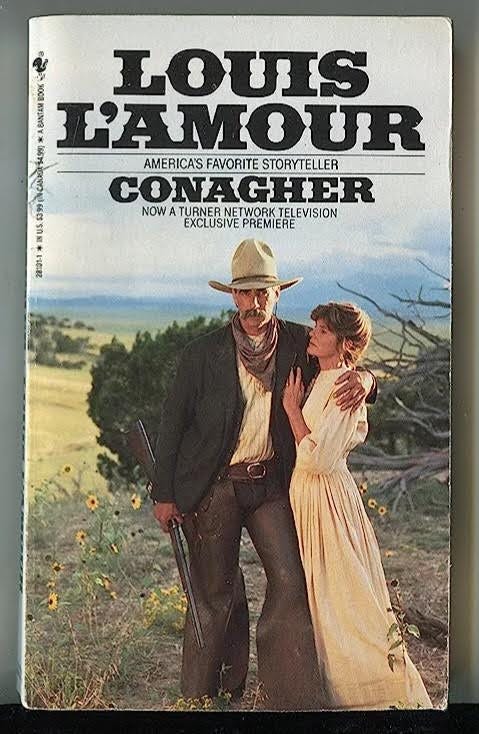Greetings, avid readers!
Today, I have the pleasure of bringing you
.Peter writes the brilliant
, where he pushes back against the ideology and propaganda that has infested our news media. Instead, Peter is devoted to one simple proposition: Facts, evidence, and data are the best weapons against propaganda.—
Conagher is not the best book I’ve read, nor the longest, nor even the most complex. It is simply the book that has stayed with me. Subtly, almost accidentally, it has molded my worldview perhaps more than any other book I have read.
Why has it stuck around more than most of the other books I’ve read? Ultimately, it comes down the simple “ordinariness” of the main character, Conn Conagher. It would be inaccurate to say that Conagher is “the man I’ve always wanted to be.” He isn’t—I am a cost accountant turned voice and data network engineer, not a cow puncher. Yet Conagher is like me in one important respect: he is just one ordinary man.
In most respects, Conagher is not at all exceptional. He is not the archetypical western hero with a talent for a lightning fast gun-draw. He is not wealthy—throughout the story he is generally one step above penniless. He is not supremely well-educated.
What Conagher is, however, is a man who knows his own mind. He knows what he believes, and he knows how he means to live. Regardless of the challenges that come before him, he sticks to his internal moral code.
That code is as simple as he is. He is loyal. He is stubborn—too stubborn to give up and quit. He does not go looking for a fight, but he doesn’t back down when the fight comes looking for him—which it does throughout the story.
It is this simplicity that makes Conagher such a memorable character. He is the “everyman”, someone instantly relatable to just about anyone. It is no accident that Conagher quotes are lines I have used in more than one job interview, more than one sales pitch to a prospective client in my career. Even people who’ve never read a Louis L’Amour western understand and appreciate the depth of commitment contained in that single sentence:
“When I take a man’s money I ride for the brand.”
In my experience, that one sentence sticks with people a lot longer than most “professional” rhetoric that typically gets used in sales situations. I like to think that’s because it says more. It’s loyalty and commitment distilled to its essence. That alone makes it a high standard, a high bar for excellence.
When at the end of the novel Conagher has one last fight with one last opponent, and ultimately prevails just by not stopping, the other man marvels at how Conagher beat him, asking “what sort of man is he?”
Comes the answer
“He’s Conagher…and that’s enough.”
Whether the challenge is just getting up and facing the day, or tackling some major project, or even dealing with some crisis or catastrophe, ultimately that is the answer for anyone. Whoever we are, that is enough. It has to be, because whoever we are is all that we have, and all that we will ever have.
When I started writing
, I was the only resource on which I could draw for articles and content; I’m still the only resource on which I can draw for articles and content. With my articles and content I’ve earned a growing list of subscribers, and some are even willing to pay for their subscription. I’ve had the good fortune to earn the respect of an audience.Am I “enough” to make my Substack a success? So far, I have been. I have been enough to get All Facts Matter started and I am enough to keep it going; to me, that’s success.
So long as I keep writing, keep researching, keep working at producing good articles with sound analyses grounded in facts, I don’t see myself failing. So long as I keep delivering the factual content my audience wants, I see myself continuing to succeed.
Like Conagher, so long as I don’t stop and don’t compromise my principles or myself, I can hope to continue growing and evolving my newsletter, and that’s the real success for me—moving it forward, being able to read, research, analyze, and finally write, sharing the topics that interest me with the wider world.
That is how Conagher wins the fight—and wins the girl (this is a western story, after all, and what happy ending for a western would it be if he didn’t win the girl?)—just by being who he is. In every situation, Conagher is all he has. By not giving up, and by not betraying who he is, Conagher is all he needs. By not giving up, by not betraying who he is, Conagher prevails time and again.
If all this sounds simple, it is—and that’s the point. There are no fancy words here, and there are none in Conagher. None are needed.
Perhaps it seems simplistic, trite, even naive to speak of not giving up, of not compromising oneself, as key to any success—yet ideas and phrases become trite because they are true, so obviously true that nothing remains to be said about them. Nothing remains to be said about them, and yet they remain, always hanging around, never fading away. Like Conagher, they prevail just by being what they are, no more and no less.
Conagher is a tale of a man who does not give up. It is the story of a man who endures long enough to prevail. For that reason, it is a story I hope to emulate.
I am not Conagher, just a man who hopes he will endure long enough to prevail.
P.S. If you’d like to write for The Books That Made Us, please see here.







“Whoever we are, that is enough. It has to be, because whoever we are is all that we have, and all that we will ever have.”
The entire post is excellent, and these lines particularly so. I think there’s a hamster wheel that we apply to everything, even personal development. While development is great, I’m finding that a fundamental ‘enoughness’ is an acceptance of oneself.
Thank you for sharing!
Very cool! I think it's funny how very specific things stick with us, not because they're the best or even necessarily a favorite.
Like, the show Hery Arnold has stuck with me longer than most things from childhood for both funny and complicated reasons.
Also, I just recently read my first Louis L'Amour novel and was surprised how much I liked it! Surprised further by how much it seems like it must have influenced Cormac McCarthy's own westerns.